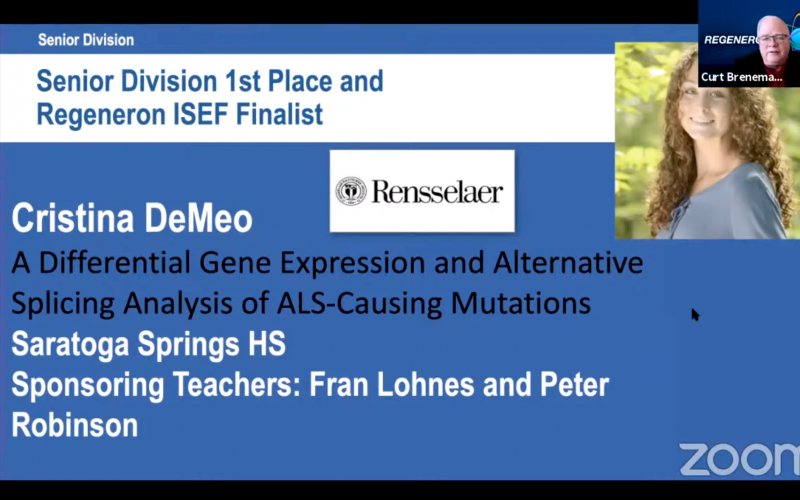Next Generation RNA Researcher

One of the youngest members of the RNA Institute's 2020 Summer Bioinformatics program, Cristina DeMeo, has put the skills she learned to great use. Cristina, a local high school student has used her knowledge of the computational analysis of large datasets (bioinformatics) to create an award-winning science project on the most common form of motor neuron disease - amyotrophic lateral sclerosis (ALS). Her subsequent project, titled “A Differential Gene Expression and Alternative Splicing Analysis of ALS-Causing Mutations” won 1st place in the Biomedical 1 section of the Eastern New York Seventeenth Annual Subregional Junior Science and Humanities Symposium (JSHS) and the senior division 1st place prize at the 2021 Greater Capital Region Science and Engineering Fair. Cristina will now progress to the 2021 Regeneron International Science and Engineering Fair which will be held virtually in May. We couldn’t be prouder of Cristina and her work!
Cristina’s story is an excellent demonstration of the Institute’s mission to train the next generation of RNA researchers. Trainees from all levels are welcome to participate in Institute programs and we are always open to philanthropic support for programs like the one that has led to Cristina’s wonderful accomplishment. A detailed description of Cristina’s project is provided below and provides an excellent example of the educational and research power of RNA. Please join us in supporting Cristina and our other RNA trainees as they help us understand the biological role of RNA, develop RNA as a scientific tool and harnessing this knowledge to improve human health.
We are happy to report that Cristina won a 4th Award in the Computational Biology and Bioinformatics division at the largest Global High School STEM competition, Regeneron ISEF 2021.
Congratulations from everyone at The RNA Institute!
A Differential Gene Expression and Alternative Splicing Analysis of ALS-Causing Mutations
Cristina DeMeo Saratoga Springs High School, Saratoga Springs, NY Teacher: Ms. Lohnes, Mr. Robinson / Mentor: Dr. Andy Berglund, University at Albany
Amyotrophic Lateral Sclerosis (ALS) is a fatal neurodegenerative disorder characterized by death of upper and lower motor neurons and progressive paralysis of the extremities. ALS is a complex disease caused by a mutation on one of several genes including C9orf72, FUS, and TDP-43. Symptoms include glutamate imbalance, protein aggregation, and RNA metabolism deregulation but the exact etiology of the disease remains ambiguous. Various types of ALS present as the same disease but their differences have not been studied in depth. Detecting similarities could provide scientific insight into predominant disease-phenotype causing mechanisms and deregulation. Bioinformatics analysis is a genome wide examination of biological RNA-sequencing data. iPSC derived motor neuron RNA-seq data of patients with C9orf72 ALS, FUS ALS, and TDP-43 ALS was obtained through Sequence Read Archive. A STAR Alignment and DESeq2 were performed to analyze gene expression. rMATS and Maser were utilized to investigate abnormal isoform expression. The resulting data from each mutation group was compared, and enrichment analysis was completed using DAIVD. A small number of commonalities were discovered between all mutations suggesting that treatment dependent on specific gene mutation may be beneficial to patients with ALS. The most significantly deregulated pathways involved the extracellular matrix, transcription, and cell-cell adhesion. As search for treatment continues, the deregulated pathways identified in this novel study should be considered and may be a root cause of the cascade of symptoms leading to motor neuron degradation and patient death.


